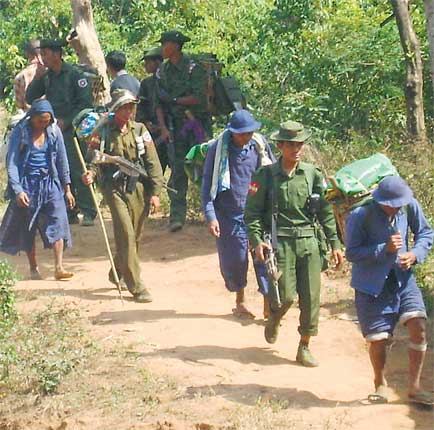Burma accused of using prisoners to clear landmines
Rights groups allege that convicts have been used as human triggers for mines in the war against ethnic tribes

Your support helps us to tell the story
From reproductive rights to climate change to Big Tech, The Independent is on the ground when the story is developing. Whether it's investigating the financials of Elon Musk's pro-Trump PAC or producing our latest documentary, 'The A Word', which shines a light on the American women fighting for reproductive rights, we know how important it is to parse out the facts from the messaging.
At such a critical moment in US history, we need reporters on the ground. Your donation allows us to keep sending journalists to speak to both sides of the story.
The Independent is trusted by Americans across the entire political spectrum. And unlike many other quality news outlets, we choose not to lock Americans out of our reporting and analysis with paywalls. We believe quality journalism should be available to everyone, paid for by those who can afford it.
Your support makes all the difference.Dramatic testimony from escaped prisoners has revealed how the Burmese army is forcibly using convicts to serve as porters on the frontlines in military operations against ethnic tribes. Prisoners have been tortured, used as human triggers for landmines and – in some cases – summarily executed, according to human-rights groups.
Plucked from Burma's crowded jails scattered across the country, the prisoners are driven to operations in the east where troops are battling ethnic Karen rebels, who have opposed the state since its independence in 1948.
"We were carrying food up to the camp and one porter stepped on a mine and lost his leg," one prisoner, who subsequently escaped, told rights activists. "The soldiers left him; he was screaming but no one helped. When we came down the mountain he was dead. I looked up and saw bits of his clothing in the trees and parts of his leg in a tree." Another prisoner forced to carry supplies told about being shot after he and a group of 15 other prisoners ran away from the battlefield.
The prisoner, who used a fictitious name, said: "The soldiers told us at night that there was a lot of fighting on the mountain and that if we were alive tomorrow night we would be lucky. We heard the [soldiers] yell, 'Don't run, don't run'. I turned around to look and was hit with the first shot... the bullet hit my right shoulder and broke my arm. It knocked me down on to the ground."
The testimony is included in a report compiled by Human Rights Watch (HRW) and the Karen Human Rights Group. The report, Dead Men Walking, is based on interviews with almost 60 prisoners who have escaped from forced labour since 2010. "Convict porters are the Burmese army's disposable human pack mules. Press-ganging prisoners into deadly front-line service raises the Burmese army's cruelty to new levels," Elaine Pearson, of HRW, said.
In the general hospital of Mae Sot on the Thai-Burma border, the wards are busy because of the war taking place in the mountains. The scarred and bandaged spill into the corridors. Virtually all of them are here because of one weapon: landmines.
The war also causes the vulnerable to flee in hungry throngs away from a conflict that often encompasses civilian populations.
Join our commenting forum
Join thought-provoking conversations, follow other Independent readers and see their replies
Comments